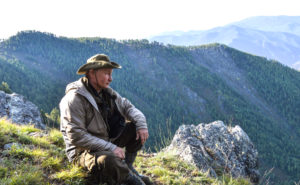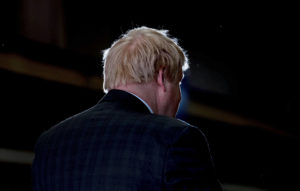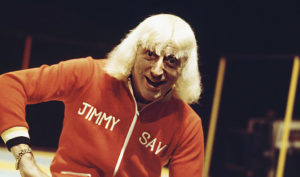It’s Valentine’s Day, 1922, and we’re in a rain-soaked field in the village of Writtle, deepest Essex. Night is drawing in. The clock ticks towards 7.15. In a low, chilly army hut, a man in a thick tweed suit leans towards the microphone and prepares to make history.
“Hello CQ, hello CQ. This is Two Emma Toc, Two-ooo Emma Toc. Writtle calling… Well, I think we’re ready to begin now, and the first thing I’ve got to introduce is a record entitled — Why are records always entitled, why aren’t they just called something? So here it is, a record entitled…”
Four years earlier, Captain Peter Eckersley had been a wireless operator in the Royal Flying Corps. Now, as an engineer with the Marconi Wireless Telegram Company, he was launching Britain’s first weekly radio station, broadcasting under the call sign 2MT (“Two Emma Toc”). Eckersley was a joker, a character, a bit of a card. And every Tuesday, radio enthusiasts across south-eastern England would tune their sets to catch his latest offering: a quiz, perhaps, or a spoof weather forecast.
Eckersley and his pals put on Britain’s first ever radio play, an adaptation of Cyrano de Bergerac. They persuaded some of the capital’s most popular singers to trek out to Writtle and perform into the ether. On one memorable occasion the world-famous Danish-American baritone Lauritz Melchior even agreed to trudge across the fields to the Writtle army hut and sing to an audience of… hundreds? Thousands? Who knows?
What happened at Writtle a hundred years ago isn’t just a lovely little tale about the triumph of the amateur spirit. It’s the origin story of one of Britain’s most beloved and controversial institutions, the BBC, which celebrates its centenary this autumn. And since the BBC’s future has never been more contested, with Boris Johnson’s government publicly contemplating the end of the licence fee and a turn towards a subscription model, it’s worth looking back at how it all began.
To its defenders, the BBC represents the collective national good over selfish private interest. But is that really true? If you were feeling cynical, you might argue that it began as a commercial monopoly to promote the interests of the major electronics firms. Its champions celebrate it as modern history’s greatest vehicle for popular cultural uplift. But you could just as well see it as a massive exercise in selling radios.
To the BBC’s fans that probably sounds like sacrilege, so let’s go back to that man in the hut. Peter Eckersley didn’t just happen to work for Marconi. The fact that he worked for the Marconi Company, one of the most innovative, ruthless and expansionist firms in the land, was absolutely crucial. Since the end of the First World War, Marconi’s engineers had wasted no opportunity to promote the latest wireless technology. It was Marconi, for example, that organised Britain’s first live radio broadcast on 15 June 1920, when the soprano Dame Nellie Melba performed at its Chelmsford factory. This was a landmark in broadcasting history, with people reportedly tuning in from as far away as the Champs-Elysées. These days, though, the BBC makes little of it. Why not? Alas, it was sponsored by the Daily Mail. Quelle horreur!
You can draw a line directly from Dame Nellie’s performance, via Eckersley’s hut, to the formation of the British Broadcasting Company on 18 October 1922, and the Marconi name is there at every turn. In one crucial memo, the firm’s publicity manager, Arthur Burrows, argued that they could make an awful lot of money through the “radiation” of entertainment to the public, rather than by merely selling hardware to the government. So perhaps, in some parallel universe, there’s a Britain in which the Marconi Company really did establish its own private radio service, and where the papers are currently badgering the Marconi streaming giant to cancel Jimmy Carr.
But as we know, things didn’t work out like that. In a world obsessed with the danger of political and cultural disorder, the men who ran the General Post Office were anxious to avoid the “chaos” of the United States, where hundreds of radio start-ups had blossomed in 1921 and 1922. What was more, state control had been legitimised by the experience of total war, covering everything from military conscription to pub opening times. Much better, they thought, to have a single authorised broadcaster, a state-approved consortium: a British Broadcasting Company.
So in the autumn of 1922 the six largest firms, led by Marconi, formed a monopoly, authorised by the General Post Office and funded by a 10-shilling radio licence fee. And everybody won. The BBC set out on the path that would lead to Fawlty Towers, I, Claudius, Blake’s 7 and Eldorado. Arthur Burrows became its first director of programmes. Eckersley became its first chief engineer. And Marconi sold thousands and thousands of radios.
Why isn’t this story better known? The BBC’s centenary website, barely mentions it at all. Its timeline begins in the autumn of 1922, erasing poor Dame Nellie and skipping the Writtle story entirely. The explanation is obvious. The Marconi story just doesn’t fit. The history of the BBC is supposed to be an object lesson in paternalistic liberalism and public service, but the Marconi story is all about private enterprise. Marconi meant novelty; Marconi meant disruption. But today’s BBC is the guardian of continuity, a reassuring comfort blanket in a world of change. How do Dame Nellie and the Daily Mail fit into that?
It’s easy to see why the BBC has forgotten its entrepreneurial prehistory. By the time of its 20th birthday in 1942, it had transcended its buccaneering origins to become a genuinely national institution, the voice of a people standing together against the horrors of Nazism. For the next few decades, it was one of the chief pillars of the social democratic consensus, the broadcasting equivalent of the NHS.
This BBC didn’t just influence the national conversation; it was the national conversation. Famously, the very last show Eric Morecambe and Ernie Wise made for the corporation, which went out on Christmas Day 1977, was watched by more than 20 million people. The supporting cast — Elton John, Michael Parkinson, Penelope Keith, Richard Briers, Arthur Lowe, John Le Mesurier, Frank Bough, James Hunt, Angela Rippon — was a Who’s Who of the British imagination, every name immediately recognisable. When you walked down the street the next day, almost half of the adults you met had seen it.
In his novel The Rotter’s Club (2001), Jonathan Coe uses that Morecambe and Wise Christmas special as a symbol of national consensus, the teenage hero realising that everybody he knows is watching it too. “It came to him,” writes Coe,
“that he was only one person, and his family was only one family, out of millions of people and millions of families throughout the country, all sitting in front of their television sets… all of them laughing at the same joke, and he felt an incredible sense of… oneness, that was the only word he could think of, a sense that the entire nation was being briefly, fugitively drawn together in the divine act of laughter.”
There’s an underlying melancholy to that scene, though. By the time Coe wrote The Rotter’s Club, the BBC’s paternalistic monopoly was already under siege. The first blow came in 1955 with the launch of ITV, followed by the advent of Channel Four in 1982. British Satellite Broadcasting arrived in 1986, Sky three years later. We all know the rest: the internet, Amazon, Netflix, Disney. Or to put it another way, change — the kind of technological and cultural innovation previously embodied by the men in that Writtle hut.
It’s change, not Conservative hostility — and certainly not Nadine Dorries — that represents the real threat to the BBC’s survival. In the last few weeks its defenders on social media have circulated a wonderful advert from 1986, in which pub bore John Cleese curses the licence fee and wonders what the BBC “has ever given us for fifty-eight quid”. Up pops a host of famous faces — Sir Michael Hordern, Barry Norman, Alan Whicker, Sir Patrick Moore — to put him right.
It’s heart-warming, nostalgic stuff. But to anybody under the age of 30 it must be completely irrelevant. Most of those people have long since died, retired or been cancelled. They’re relics of a vanished age.
It’s telling, then, that when people try to defend the BBC, they typically point to Strictly Come Dancing and Doctor Who — two shows that, one way or another, could have been watched by Sir Winston Churchill in his dotage. Strictly’s current incarnation dates from 2004, but in its original form, as plain Come Dancing, it dates from 1949. As for Doctor Who, it dates from 1963 and is now attracting its lowest audience since the premiership of Margaret Thatcher. In a bid to revive its fortunes, the BBC have just persuaded its former writer Russell T. Davies, who ran the show more than a decade ago, to return to the helm. You can’t get much more backward-looking than that.
I take no pleasure in pointing this out. For anybody like me, born in the Seventies or earlier, a world without the BBC seems unimaginable. I have merely to hear the opening bars of Grandstand, a staple of my Saturdays for decades, and the hairs stand up on the back of my neck. But Grandstand has been dead for 15 years, rendered obsolete when the BBC’s commercial rivals snapped up all the sports rights. And although Match of the Day endures, it’s easy to imagine a future in which Amazon bags the Premiership highlights. How long before that jaunty theme music vanishes forever? Five years? Ten?
Against that background, talk of the current government’s “attack” on the BBC strikes me as fundamentally inconsequential. Even if Boris Johnson’s successor kneels in penance outside Broadcasting House and promises to preserve the licence fee till the end of time, the basic problem remains: the BBC was designed for radio and television sets, not for mobile phones and iPads. It’s a national institution in a globalised world, a product of the twentieth century struggling to stay afloat in the twenty-first.
A few weeks ago a YouGov poll found that only one in four people aged 18-30 watch the BBC every week. A third of them never watch it at all. No doubt some will graduate to the BBC’s output as they grow older — but surely not all of them. What about today’s primary-school children? Will the Marvel and Mandalorian addicts be watching Newsnight in the year 2040? Will they really still be clinging to Grandad’s comfort blanket?
To some readers, I know, this probably sounds like heresy, a premature obituary for a much-loved institution. But I do like the BBC. (I don’t “love” it, obviously, because I’ve worked for it, and nobody who’s been a victim of its taxi-booking system is ever going to love it.) And because I’m a nostalgic, backward-looking sort of person, I want it to survive. I adore In Our Time, I love The Apprentice (I know, ridiculous) and I still watch Doctor Who, albeit out of a joyless sense of duty.
Much of what the BBC does, it does brilliantly. I’ll be sorry, then, when it goes. But it will go, eventually. Or rather, it’ll probably fragment into its constituent parts, some of which will charge for subscriptions. No doubt it’ll be a gradual process, and many people will barely notice. On Twitter, the BBC’s champions will lament the death of a common national culture. But our common national culture has been fragmenting for decades, which is why Jonathan Coe lamented its passing more than 20 years ago.
Cultural moments come and go. Institutions are born and they die. In fact, everything dies; that’s how history works. The future belongs to the ambitious, the disruptive, the change-makers — people like the engineers in that hut. But these days, people like that don’t work for the BBC. They work for Amazon.
Disclaimer
Some of the posts we share are controversial and we do not necessarily agree with them in the whole extend. Sometimes we agree with the content or part of it but we do not agree with the narration or language. Nevertheless we find them somehow interesting, valuable and/or informative or we share them, because we strongly believe in freedom of speech, free press and journalism. We strongly encourage you to have a critical approach to all the content, do your own research and analysis to build your own opinion.
We would be glad to have your feedback.
Source: UnHerd Read the original article here: https://unherd.com




